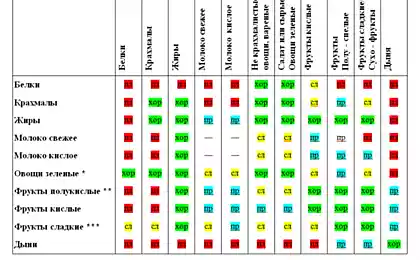444
As the sugar industry has bribed scientists and dumped the blame on fats
The dispute about which food is the cause of cardiovascular disease, more than half a century. These discussions began in the U.S. in 50 years due to abnormally high mortality due to diseases of the heart.
Scientists discussed two alternative hypotheses: according to one of them most strongly to our health threatened by the high consumption of sugar. The main advocate of this theory was a British physiologist and nutritionist John Yudkin, author of the book "Pure, white and deadly: problem of sugar".
Utkin was an active supporter of low-carb diets, which he recommended not only to reduce weight but also to reduce the risk of cardiovascular and many other diseases, including diabetes, dental caries.

Another theory has positioned the fats, especially saturated, as the main culprit of our troubles. According to the founder of this theory, the American epidemiologist Anselm CIMS, high saturated fat consumption contributed to the growth of level of cholesterol, which, in turn, led to atherosclerosis, heart attacks and strokes.
At the initial stage it was an active scientific debate, where each party had its supporters. But quickly this confrontation ended in a complete and unconditional victory Ansel kitty. The theory of John. was recognized as incorrect, it is ridiculed. All this has forced The. to finish his academic career.
Published data indicate that a significant role in this scientific debate and in the formation of generally accepted principles of healthy eating have played a lobby of the sugar industry. Published in the journal JAMA article "the Sugar industry and cardiovascular disease" in detail and convincingly explains how the sugar producers and their lobbying organization SRF (Sugar Research Foundation) directly funded scientists to publish relevant research results, removing suspicion from sugar and shifting the blame on fats.
The sugar industry has quite early recognized the commercial potential of giant contained in "anti-fat" theory Ansel kitty. In 1954, President of SRF, Henry Hess has made in his speech the strategic opportunities for the sugar industry: "to Increase the share of the sugar market, promoting the shift of Americans to follow a low-fat diet [...] If the industry of carbohydrates can intercept 20% of the calories in the American diet (the difference between 40 percent [of calories] derived from fat now, 20% that we must obtain), and if the sugar would retain its share of the market of carbohydrates, this change will lead to an increase in sugar consumption per capita more than a third, and to remarkable improvements in population health."
The explosive growth of obesity, diabetes and other metabolic diseases in the last decades casts doubt on the thesis of the "Grand health", but in the Grand increase in profits of the sugar industry, no doubt. Predictions of Henry Hess came to pass with amazing accuracy: from 1960 to 2000 consumption of all types of sugar (including corn syrup) per capita grew in the U.S. for exactly one-third. And not only in the USA follow a low-fat paradigm has covered almost the entire world. Since the early 60-ies of the world sugar consumption has increased 2.8 times, while the population of the planet over the same period increased by only 2.3 times.
For these outstanding achievements of the sugar industry made a serious effort and spent a lot of money to buy the support of the scientific community. Although, given the total volume of the sugar market, the financing need for the sugar industry research articles was relatively small, but strategically important investment.

For starters, SRF allocated $ 600 thousand (equivalent to 5.3 million dollars in modern money) to inform the public that "sugar is what keeps people alive and gives us the energy needed to perform everyday tasks."
The question of the potential harm of sugar for health stood in the 60 years very serious. Several published scientific works, including and for the authorship of John., showed how high sugar intake increases the risk of cardiovascular diseases, for example, increasing the level of triglycerides in the blood. Published in JAMA, the documents show that the lobby of sugar producers closely followed these publications and actively worked to neutralize the effect of them.
In 1967, SRF had paid three Harvard scientists (including the head of the Department of Nutrition at Harvard medical school Fredrik Steyr) 6,500 dollars (the equivalent of $48,000 in today's money) for writing critical review of research papers linking sugar to various risk factors. Now published correspondence shows that scientists are well aware that the true purpose of their work is to serve corporate interests. "We are all well aware of your special interest in carbohydrate — wrote one of the "recruited" scientists mark Hegsted the representative of the SRF, and will try to do everything possible in this direction."
Publication of critical review was constantly postponed, since the number of articles on the harm of sugar, and increased after each such publication a review in need of further improvement. The final work published in 1967 in the form of two articles in the influential medical journal New England Journal of Medicine (NEJM). The authors have made every effort to discredit the supposed link between sugar and cardiovascular disease. Comparing different approaches to the modification of food, they came to the conclusion that the only correct method of reducing cardiac risk — limiting consumption of saturated fats and cholesterol. On funding from the SRF, the authors of the critical review chose to remain silent.
Publication in the NEJM was one of the key moments in the great campaign against the "school.". From Ansel kitty had powerful allies — the American Institute of health (NIH) and American heart Association (AHA), as well as good connections in the Senate and Congress of the United States. With lobbying organizations, the food industry they managed to achieve full and unconditional victory of the "anti-fat" theory and formal consolidation of his victory in the form of Dietary recommendations of the U.S. government, regularly published since 1980.
Over the past half century, much has changed. The authors of the review in the NEJM is no longer alive, and the rules published in scientific journals sources of funding and potential conflicts of interests were tightened — in our time, the author would be much more difficult to hide who's behind their work. But the practice of financing the food industry needs scientific researches are actively ongoing. The concern Coca-Cola spends the millions of dollars. As, however, and many other industry giants. The authors published in 2013 in the journal PLOS critical review concluded that the approval of the safety of sugary drinks is 5 times more common in work funded by the manufacturers of these drinks than in independent industry research.
Sometimes the desire to please the sponsors already leads to quite absurd results: for example, paid for by the Association of manufacturers of chocolates, a study claimed that children who eat a lot of sweets, less prone to be overweight, compared to those who sweet he is.

Professor of nutrition at new York University, Marion Nestle (no relation to the eponymous group) has considered the 168 papers published in the last year, and 156 of them contain conclusions favorable to sponsors.
"Sponsored by the industry nutrition research, and research, to sponsor tobacco, chemical and pharmaceutical industries, with almost no variations produce results confirming the benefit of, or at least lack of harm, the sponsor's products, even when independent studies come to opposite conclusions," writes Nestle in an editorial in JAMA.
In recent years, consumption of sugar and fats is undergoing major changes. Use nizkorodov diets does not seem immutable dogma, but new studies refute the link saturated fat with cardiovascular disease. Changed attitude to sugar. His high consumption with cardiovascular disease is confirmed by a large number of scientific papers and recognized by the American heart Association. Actively discussed the Association between sugar consumption and diabetes, obesity and other metabolic diseases. The book of John. was re-released in 2012 — for the first time in decades.
Also interesting: Nutritionists equated juices to Coca-Cola
Scandalous discovery: scientists 40 years hid the results of the study
World health organization urges humanity to eat less sugar. But will its consumption back at least to the level that was before the "war on fats"? If that ever happens, then obviously, very soon.published
Source: lchf.ru/13248
Scientists discussed two alternative hypotheses: according to one of them most strongly to our health threatened by the high consumption of sugar. The main advocate of this theory was a British physiologist and nutritionist John Yudkin, author of the book "Pure, white and deadly: problem of sugar".
Utkin was an active supporter of low-carb diets, which he recommended not only to reduce weight but also to reduce the risk of cardiovascular and many other diseases, including diabetes, dental caries.

Another theory has positioned the fats, especially saturated, as the main culprit of our troubles. According to the founder of this theory, the American epidemiologist Anselm CIMS, high saturated fat consumption contributed to the growth of level of cholesterol, which, in turn, led to atherosclerosis, heart attacks and strokes.
At the initial stage it was an active scientific debate, where each party had its supporters. But quickly this confrontation ended in a complete and unconditional victory Ansel kitty. The theory of John. was recognized as incorrect, it is ridiculed. All this has forced The. to finish his academic career.
Published data indicate that a significant role in this scientific debate and in the formation of generally accepted principles of healthy eating have played a lobby of the sugar industry. Published in the journal JAMA article "the Sugar industry and cardiovascular disease" in detail and convincingly explains how the sugar producers and their lobbying organization SRF (Sugar Research Foundation) directly funded scientists to publish relevant research results, removing suspicion from sugar and shifting the blame on fats.
The sugar industry has quite early recognized the commercial potential of giant contained in "anti-fat" theory Ansel kitty. In 1954, President of SRF, Henry Hess has made in his speech the strategic opportunities for the sugar industry: "to Increase the share of the sugar market, promoting the shift of Americans to follow a low-fat diet [...] If the industry of carbohydrates can intercept 20% of the calories in the American diet (the difference between 40 percent [of calories] derived from fat now, 20% that we must obtain), and if the sugar would retain its share of the market of carbohydrates, this change will lead to an increase in sugar consumption per capita more than a third, and to remarkable improvements in population health."
The explosive growth of obesity, diabetes and other metabolic diseases in the last decades casts doubt on the thesis of the "Grand health", but in the Grand increase in profits of the sugar industry, no doubt. Predictions of Henry Hess came to pass with amazing accuracy: from 1960 to 2000 consumption of all types of sugar (including corn syrup) per capita grew in the U.S. for exactly one-third. And not only in the USA follow a low-fat paradigm has covered almost the entire world. Since the early 60-ies of the world sugar consumption has increased 2.8 times, while the population of the planet over the same period increased by only 2.3 times.
For these outstanding achievements of the sugar industry made a serious effort and spent a lot of money to buy the support of the scientific community. Although, given the total volume of the sugar market, the financing need for the sugar industry research articles was relatively small, but strategically important investment.

For starters, SRF allocated $ 600 thousand (equivalent to 5.3 million dollars in modern money) to inform the public that "sugar is what keeps people alive and gives us the energy needed to perform everyday tasks."
The question of the potential harm of sugar for health stood in the 60 years very serious. Several published scientific works, including and for the authorship of John., showed how high sugar intake increases the risk of cardiovascular diseases, for example, increasing the level of triglycerides in the blood. Published in JAMA, the documents show that the lobby of sugar producers closely followed these publications and actively worked to neutralize the effect of them.
In 1967, SRF had paid three Harvard scientists (including the head of the Department of Nutrition at Harvard medical school Fredrik Steyr) 6,500 dollars (the equivalent of $48,000 in today's money) for writing critical review of research papers linking sugar to various risk factors. Now published correspondence shows that scientists are well aware that the true purpose of their work is to serve corporate interests. "We are all well aware of your special interest in carbohydrate — wrote one of the "recruited" scientists mark Hegsted the representative of the SRF, and will try to do everything possible in this direction."
Publication of critical review was constantly postponed, since the number of articles on the harm of sugar, and increased after each such publication a review in need of further improvement. The final work published in 1967 in the form of two articles in the influential medical journal New England Journal of Medicine (NEJM). The authors have made every effort to discredit the supposed link between sugar and cardiovascular disease. Comparing different approaches to the modification of food, they came to the conclusion that the only correct method of reducing cardiac risk — limiting consumption of saturated fats and cholesterol. On funding from the SRF, the authors of the critical review chose to remain silent.
Publication in the NEJM was one of the key moments in the great campaign against the "school.". From Ansel kitty had powerful allies — the American Institute of health (NIH) and American heart Association (AHA), as well as good connections in the Senate and Congress of the United States. With lobbying organizations, the food industry they managed to achieve full and unconditional victory of the "anti-fat" theory and formal consolidation of his victory in the form of Dietary recommendations of the U.S. government, regularly published since 1980.
Over the past half century, much has changed. The authors of the review in the NEJM is no longer alive, and the rules published in scientific journals sources of funding and potential conflicts of interests were tightened — in our time, the author would be much more difficult to hide who's behind their work. But the practice of financing the food industry needs scientific researches are actively ongoing. The concern Coca-Cola spends the millions of dollars. As, however, and many other industry giants. The authors published in 2013 in the journal PLOS critical review concluded that the approval of the safety of sugary drinks is 5 times more common in work funded by the manufacturers of these drinks than in independent industry research.
Sometimes the desire to please the sponsors already leads to quite absurd results: for example, paid for by the Association of manufacturers of chocolates, a study claimed that children who eat a lot of sweets, less prone to be overweight, compared to those who sweet he is.

Professor of nutrition at new York University, Marion Nestle (no relation to the eponymous group) has considered the 168 papers published in the last year, and 156 of them contain conclusions favorable to sponsors.
"Sponsored by the industry nutrition research, and research, to sponsor tobacco, chemical and pharmaceutical industries, with almost no variations produce results confirming the benefit of, or at least lack of harm, the sponsor's products, even when independent studies come to opposite conclusions," writes Nestle in an editorial in JAMA.
In recent years, consumption of sugar and fats is undergoing major changes. Use nizkorodov diets does not seem immutable dogma, but new studies refute the link saturated fat with cardiovascular disease. Changed attitude to sugar. His high consumption with cardiovascular disease is confirmed by a large number of scientific papers and recognized by the American heart Association. Actively discussed the Association between sugar consumption and diabetes, obesity and other metabolic diseases. The book of John. was re-released in 2012 — for the first time in decades.
Also interesting: Nutritionists equated juices to Coca-Cola
Scandalous discovery: scientists 40 years hid the results of the study
World health organization urges humanity to eat less sugar. But will its consumption back at least to the level that was before the "war on fats"? If that ever happens, then obviously, very soon.published
Source: lchf.ru/13248
Empress Alexandra: On marriage and family life. Records, 1899
Find out what side it's right to sleep and why























